LisbonLisboaPortugal.com
The best independent guide to Lisbon
LisbonLisboaPortugal.com
The best independent guide to Lisbon
The Festas dos Santos Populares in Lisbon and the Marchas Populares; a guide for 2026
The Festas dos Santos Populares is a colourful and vibrant festival that takes over the whole of Lisbon for the first two weeks of June.
The 'Popular Saints Festival' celebrates the feast days of Saint Peter, Saint John and, most importantly for Lisbon, Saint Anthony - the patron saint of the city.
His feast day is on the 13th of June, and on the night before (the 12th) the city celebrates in style. The highlight of the night is the 'Marchas Populares', a huge carnival parade along the Avenida da Liberdade. Later that evening sees many traditional street parties, where everyone dances to the up-tempo 'Pimba' music and eats sardines until the sun rises.
Building up to Saint Anthony's feast day on the 13th are two weeks of revelry, with traditional dances (with Pimba bands) and impromptu BBQs selling Lisbon's favourite food, grilled sardines! Along with the festivities, the whole of Lisbon is decorated with streamers and tinsel, with these displays arguably even better than at Christmas.
The Festas dos Santos Populares is a fantastic time to be in Lisbon, and if you are fortunate to visit the city during early June you will have an incredible holiday!
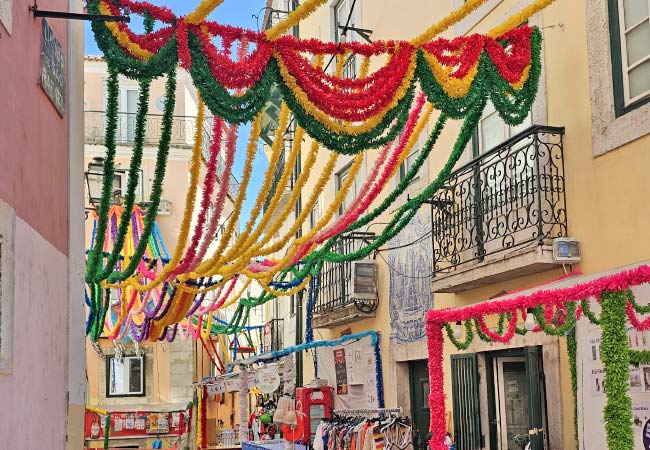
The Alfama district decorated for the Festas dos Santos Populares
The Festas dos Santos Populares and Saint Anthony
Saint Anthony (Santo Antonio) is the patron saint of Lisbon, who was born here in the year 1195, where the Igreja da Santo Antonio church stands today. His feast day is celebrated on the 13th of June (the day he died in 1231, aged 35), which is a public holiday in Lisbon.
The feast day may be on the 13th, but the real celebrations of the Festas dos Santos Populares are on the night of the 12th – this allows everyone to recover on the 13th!
As well as being the patron saint of Lisbon, Saint Anthony is also the patron saint of lovers, and flowing through the festivities is a feeling romance and young love. The culmination of this is the 'Casamentos de Santo António' (the Weddings of Saint Anthony), a mass wedding of 16 couples held at the Sé Cathedral on the 12th.
Note: The Festas dos Santos Populares is celebrated throughout the whole of Portugal and covers the feast days of Saint Peter, John and Anthony. In Porto, the celebrations are on the night of the 23rd of June and are called the Festa de São João do Porto.
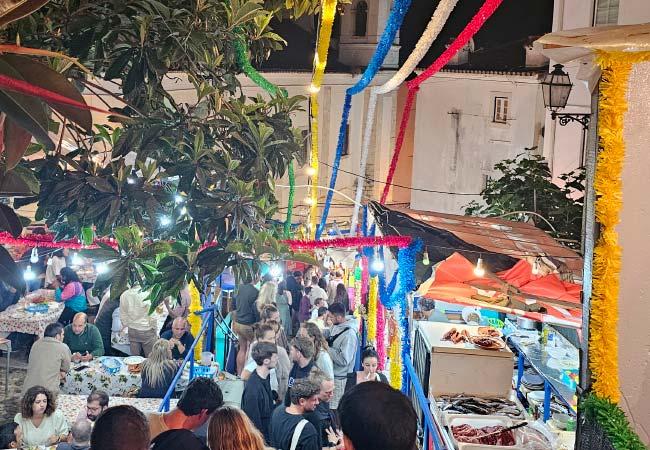
Timeline of the Festas dos Santos Populares in Lisbon
• Mid-May to end of June – Lisbon decorated with streamers and tinsel.
• First weekend of June until the 12th of June – Street parties most nights with traditional Pimba bands.
• 12th of June – The Casamentos de Santo António Santo Antonio weddings held at Lisbon Town Hall and the Sé Cathedral.
• 12th of June (8pm-11pm) – The Marchas Populares (the carnival parade) along the Avenida da Liberdade.
• 12th of June (10pm-5am) – Street parties held in every district of Lisbon
• 13th of June – Saint Anthony feast day.
• 13-30th June – Street parties with traditional Pimba music bands on Friday, Saturday and Sunday
• 24th of June – Saint John Feast day (no special events in Lisbon) – The Festa de São João do Porto in Porto (on the night of the 23rd)
• 29th of June – Saint Peter feast day (no special events in Lisbon) – The Noite de São Pedro in Póvoa de Varzim (on the night of the 28th)
Insight: The Festas dos Santos Populares celebrations are suitable for all ages. At the traditional street parties, there will be a whole range of Portuguese residents - from young children through to their grandparents - all enjoying the jolly Pimba music and delicious sardines.
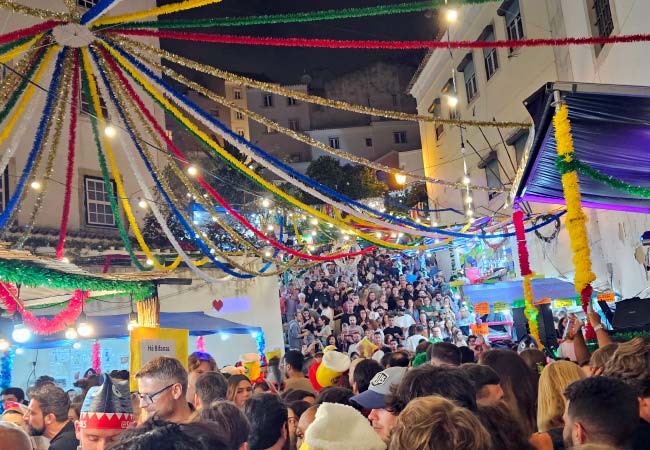
The Alfama district on 12th of June after the Marchas Populares
The Marchas Populares and the carnival parade
The carnival procession on the 12th of June is the highlight of the Festas dos Santos Populares in Lisbon.
This parade is officially known as the 'Marchas dos Bairros' (Marches of the Neighbourhoods) or often just shortened to 'Marchas Populares' (Popular Marches) or the Marchas. The event sees each of the neighbourhoods of Lisbon performing a choreographed dance route to a specially-selected song and theme. The Marchas Populares is surprisingly competitive between each of the neighbourhoods, with troupes practising for months before the event.
The judges assess the complexity of the dance routine, the performance and the outfits. The judging is done the week before the Marchas Populares, so all of the groups can relax and enjoy the night on the 12th!
It is also customary to cheer on your neighbourhood as they proceed down the Avenida da Liberdade.
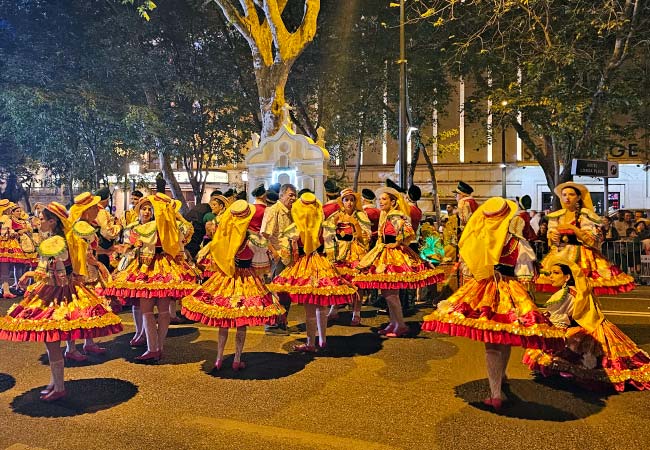
The March of the Mouraria Neighbourhood
Unlike a conventional carnival, or the more famous carnival in Rio de Janeiro (which is held at the start of lent), there are no floats or grand central structure - the focus of the Marchas are the costumes and the dance routes.
At the head of the parade are the brides and grooms of the 'Casamentos de Santo António', who were married earlier in the day at the Sé Cathedral.
The Marchas Populares starts at approximately 8pm, but this is a very long event. At two points along the Avenida da Liberdade, each of the groups perform their 15-minute routine. The parade continues for at least three hours, as there are more than 20 neighbourhoods in the Marchas.
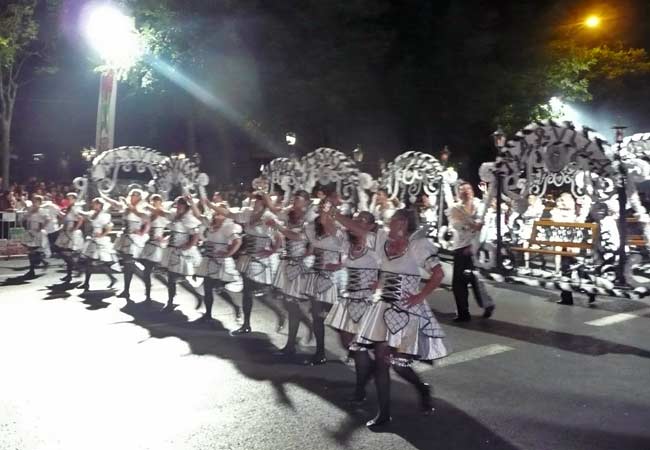
Have you booked your hotel yet?
During the peak season, demand for hotels and accommodation in Lisbon is very high. It is recommended that you book your accommodation as early as possible to secure the best prices.
The map below shows the location of hotels and rental rooms in Lisbon. By altering the date to suit your trip, the map will display current availability and prices:
A tourist perspective for the Marchas
The Marchas is one of the highlights of the Festas dos Santos Populares in Lisbon, so expect it to be incredibly crowded and very difficult to see anything. There are stands for VIPs, but most of Lisbon's residents stand six people deep or cling to trees/railings/lampposts to get better views.
At the start of the night, the Avenida da Liberdade will be incredibly packed, but towards the end of the evening (from 10pm onwards) families have drifted home and groups have been enticed by the street parties in Alfama or Bairro Alto.
These street parties on the night of the 12th are the highlight for most visitors. Entire streets of Alfama, Bairro Alto and Graca will be packed with revellers until 4am, and most of the parties continue until sunrise. Each of the districts of Lisbon will host their own parties, but the best tend to be in the downtown areas of Lisbon (such as the Baixa, Alfama, Bairro Alto, Mouraria, and Cais do Sodré districts).
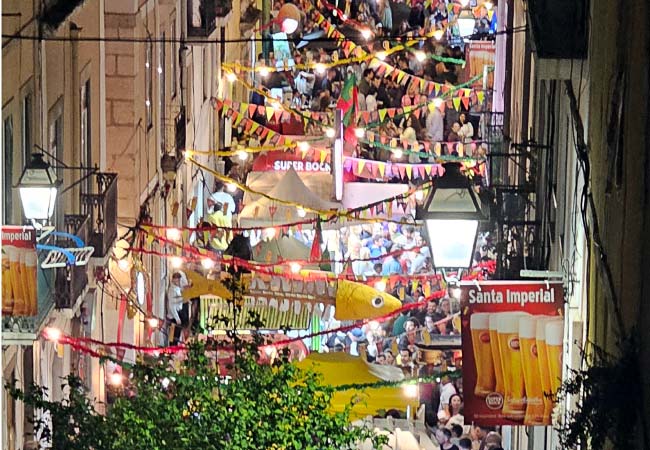
The packed streets of Bica at 3am on the night of Festas dos Santos Populares
The Santos Populares street parties
Wherever you go in Lisbon during the first two weeks of June, you will stumble across one of the many traditional street parties and fairs of the Festas dos Santos Populares.
These range in size and style, from a simple band in a cafe's garden through to entire plazas packed with stalls, food tents and drinks stands. On most nights, a 'Pimba' band will take to the stage to play the jolly and up-tempo music that is irresistible to dance to. The Pimba songs contain silly lyrics with endless amounts of innuendos that will put a smile on every Portuguese face, while the flow of alcohol means that everyone will be dancing towards the end of the night.
Along with the band, there will be a BBQ grilling sardines, food stalls and a bar serving inexpensive beer, wine, Ginjinha and Sangria. The street parties are free to enter and are great fun, especially once a few people start to dance – there will always be an older couple who know all the dance moves.
These street parties will pop-up all-over Lisbon - there are approximately 70 events throughout the city. Some of the best are the smaller ones, hidden down the closed-off alleys, which is where locals tend to go. To find the best in your district, chat to your hotel staff or ask at the restaurants you often frequent.
Insight: These parties are held most nights in June leading up to the 13th. After the 13th, they are held at the weekends only, and at the larger sites.
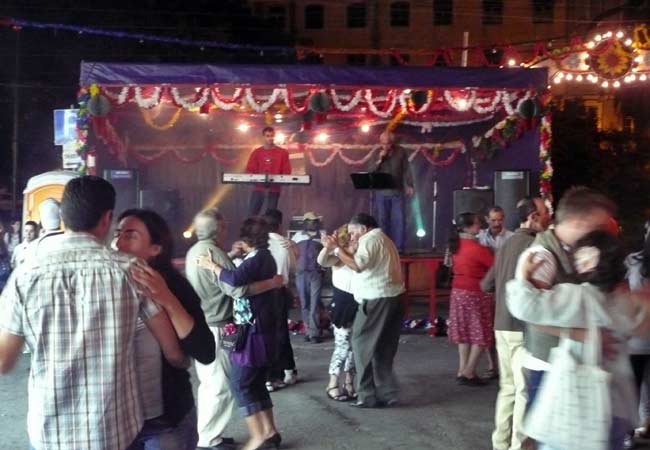
A traditional dance to a Pimba band
Traditions of the Festas dos Santos Populares
There are many traditions and customs associated with the Festas dos Santos Populares, and some of the best are:
Grilled Sardines
Sardines are so intertwined with the Festas dos Santos Populares that it is sometimes referred to as the 'Festival of Sardines'. The smell of grilled sardines will waft through the streets of Lisbon as BBQs appear in front of every cafe and in every plaza.
The origin of this tradition refers to the legend of Saint Anthony and the sardines. Saint Anthony was a great preacher, and legend has it that a shoal of sardines once stopped swimming to listen to him as he practised his sermon by a river.
June is also the start of the sardine fishing season (which extends from June to October).
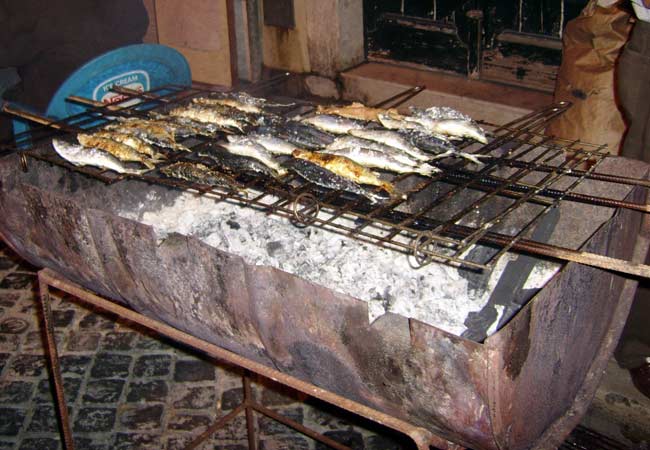
The Majericos
A sweet tradition of the celebrations is to give a Majericos (a basil bush) to your partner or loved one, which has a romantic poem attached.
The Manjerico were originally known as 'valentine's herb' and were given by a man as a proposal to marriage, which the woman had to keep until the feast of Santo António - the patron saint for lovers and match-making.
This tradition no longer exists in Portugal, but has evolved into giving a basil bush to your partner during the Festas dos Santos Populares. Found at most fairs will be stalls selling small basil bushes or decorative paper representations.

A Majericos stall in the Santos Populares
The Casamentos de Santo António weddings
The Casamentos de Santo António is mass wedding held on the 12th of June, which traditionally helped the poor of Lisbon have a grand marriage in the splendour of the Sé Cathedral.
Although it could be easily believed to have originated from Saint Anthony, this tradition only began in 1958 after an idea printed in a newspaper (Diário Popular). Today, the weddings are free for the couples, being sponsored by a TV station.
Discover more of Lisbon with our most popular guides
If you've found our content valuable, we'd welcome your support.
The digital publishing landscape has evolved significantly. As a small independent publisher, we face growing challenges. Search engines increasingly favour paid content over organic results, while AI-generated content often reproduces original work without attribution.
To support our work, please consider bookmarking this page (press Ctrl + D) for quick access. If you find an article helpful, we'd be grateful if you'd share it with friends on social media.
For specific questions, please see our Reddit community at r/LisbonPortugalTravel.
Should you notice any outdated or incorrect information, please contact us at [email protected]
Thank you for helping us continue to provide valuable content in an increasingly challenging digital environment.
A complete list of all of our Lisbon articles
If you've found our content valuable, we'd welcome your support.
The digital publishing landscape has evolved significantly. As a small independent publisher, we face growing challenges. Search engines increasingly favour paid content over organic results, while AI-generated content often reproduces original work without attribution.
To support our work, please consider bookmarking this page (press Ctrl + D) for quick access. If you find an article helpful, we'd be grateful if you'd share it with friends on social media.
For specific questions, please see our Reddit community at r/LisbonPortugalTravel.
Should you notice any outdated or incorrect information, please contact us at [email protected]
Thank you for helping us continue to provide valuable content in an increasingly challenging digital environment.




































